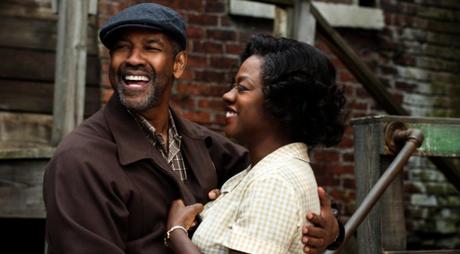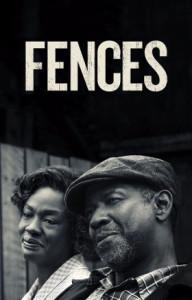
Review: Troy Maxson (Denzel Washington) walks home from work with his comrade, Bono (Stephen Henderson), talking about work and life as black men in the 1950s' Pittsburgh, before reaching Troy's home, in which Rose (Viola Davis), Troy's wife, has waited. From the blocking, the set arrangement, and the characters' gesture, we already know that Fences is adapted from a play; it is staged like a play, but it ventures further into masterclass, cinematic performance.
Troy, a hardened man, was once a talented baseball player, who never made to professional careers due to an issue which he addressed as racial segregation. He's got into an unfortunate event when he's young, but he's overcome it. Since then, Troy becomes bitter and skeptical; he's been building fences-literally and figuratively.
The fences, which he builds to keep away something from his past to sneak, has also estranged Troy's closest person. Not even his pro-football dreamer, Cory (Jovan Adepo), or his illegitimate musician-son, Lyons (Russell Hornsby) can penetrate into Troy's hardened soul. Only Rose has made peace with Troy's flaws as she loves him unconditionally despite his flaws that keeps piling and culminating in a life-changing tragedy. It's his pride, his bitterness and remorse that has built fences-barricading the man from the loves of his life.
With strong topic the film carries-a study to the life of a traumatic black man in America's blackest era, Fences is admirably well-acted. Both leads, Denzel Washington, who also directs the film, and Viola Davis, are top-notch in manifesting the exasperation and restlessness of the generation. Performances from those senior stage actors emanates emotions beyond cinematic boundary, presenting it raw and less-dramatically as if they really is living in the era, facing the same anxiety.
As an actor, Washington excels at multiple layers his character brings; however, he's a bit stiff as a director. His direction seems like he is paying homage to play performance; but, at the same time, it looks like a direct transfer from stage to screen, which ends up alienating casual film viewers. Natural approach is his least option but in acting; therefore, Fences always seems as it is a play, rather than a motion picture; however, it can still delivers its most profound message breaking the fourth wall, straight into the audiences; thanks to the brilliant acting of Washington and Davis.
In the end, Fences might serve as two competences at once: a showcase of natural-born actors whose engaging performances are moving; and a preservation of one of America's greatest play in form of motion picture. Both way, it's an excellent film.
Fences (2016)


